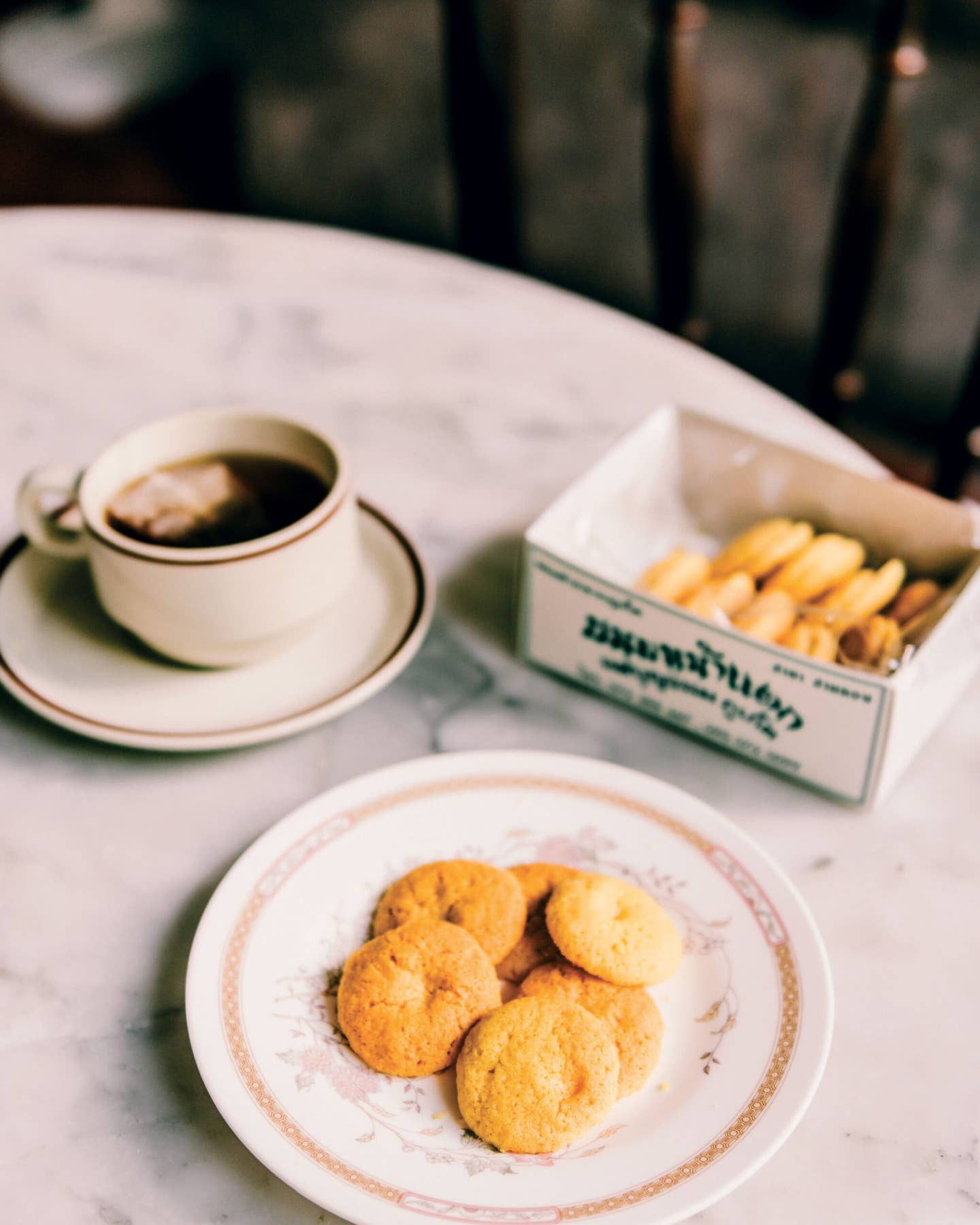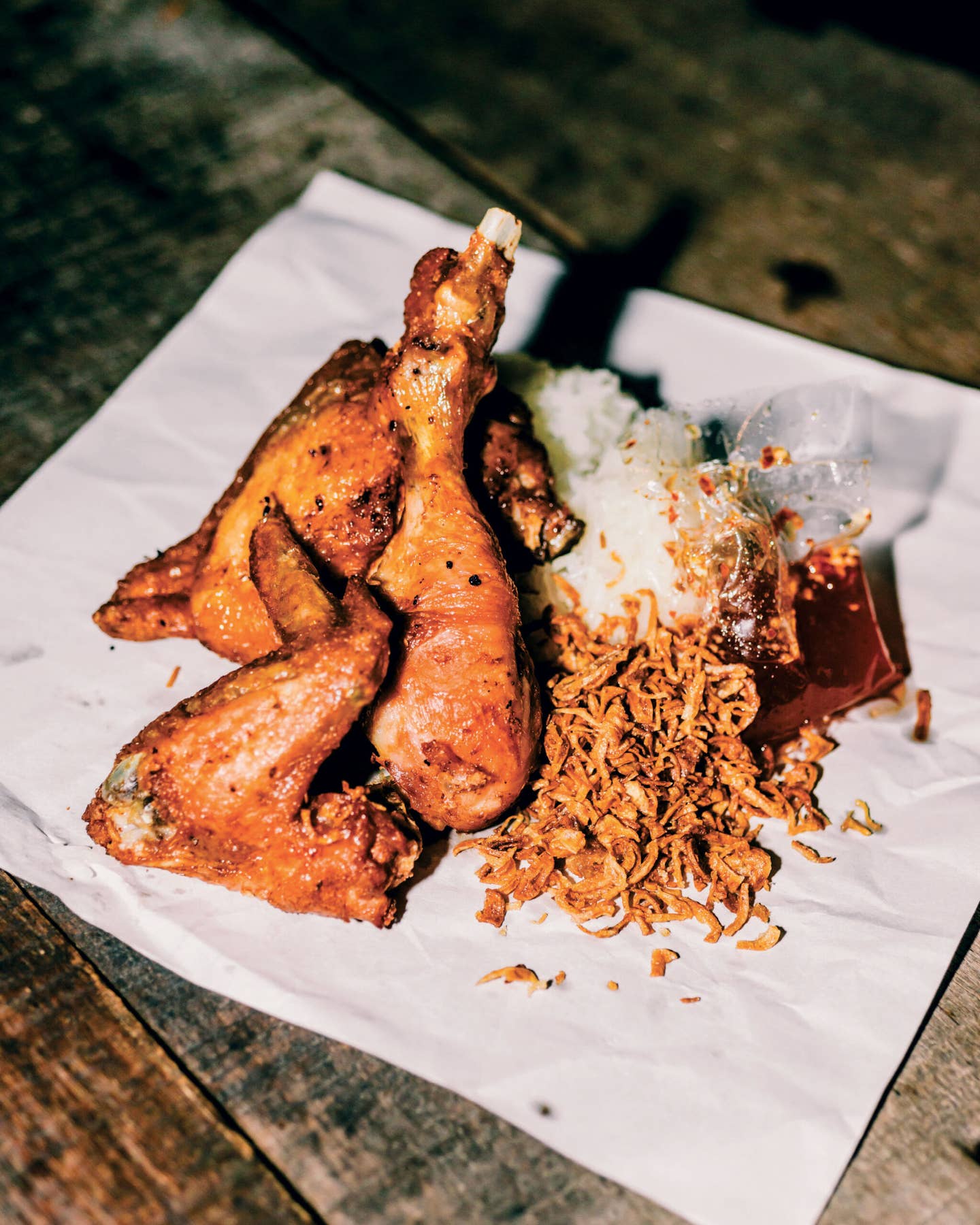
The Author of ‘The Cooking Gene’ on the Black Soul of American Eating
Historian Michael Twitty recreates the food of his enslaved ancestors to unravel the African American roots of Southern cuisine
In a category all his own, Michael Twitty glows. The independent scholar uses his celebrated blog Afroculinaria to synthesize food history and cultural debates into lofty essays. His pulpit-style commentary is grounded in the ghosts of Atlanta History Center's smokehouse and by strutting through Colonial Williamsburg's fields. And in his debut book, The Cooking Gene, he recreates the daily motions of enslaved cooks starting in the 18th century. The result is human stories literally brought to life, with period regalia and a mastery of open-fire cooking.
But his yesteryear-text-meets-memoir is more than an interpretation of slave life. The Cooking Gene is an uncommon weaving of antebellum accounts and a peek inside the venerable layers of his Gen-X soul. "I have to confess two things about me as a little kid," he writes. "I hated soul food and I didn't really like being black." It's a complicated statement that sets the stage for intimate moments like Twitty's grandma making hot potato bread in her Washington, D.C. home—his inaugural kitchen memory.
"We have come to this strange cultural moment where food is both tool and weapon. I am grateful for it," he continues in The Cooking Gene. "My entire life I knew, and many others knew, that our daily bread was itself a kind of scripture of our origins, a taste track of our lives. It is a lie that food is just fuel. It has always had layers of meaning, and humans for the most part despise meaningless food."
From Trough Mush to Red Straw Persimmon Beer, Twitter sprinkles the meaningful kind of recipe throughout the book, along with his signature deep academic binges that flow back into straightforward accounts. When he writes—and speaks—the room seeps air.
His mother’s death is the bookend. The cotton bulb in his lapel, the juju bag and yarmulke symbolically disappear, and he is stripped down. Twitty sets himself free and points us towards the north star. I spoke with him about how that freedom feels, and the awakening he undertook as a writer to get there.
A 2013 blog post about a certain Southern food star made you internet famous. Most readers had no idea of your research of enslaved colonial people. What did it take to recreate their kitchen lives?
It's a job where you have to be dedicated to jumping through the hoops of time every day. For an interpreter it means both visiting a difficult past but also being able to hone your contemporary vision based on your knowledge of the past. You have to be able to see, like Janus, both ways.
One of the reasons I open the book by describing putting on the tights and the waistcoat and cutting wood is to show that the food isn't the only thing being transformed. I have to transform my mind, body, and spirit so I can have the strength to enter the world of my ancestors—enslaved cooks—and return with my sanity intact.
The book opens with an illustration of your family tree. It's a powerful statement. Most African Americans have a difficult journey tracing their enslaved ancestors.
Knowing where an American culinarian comes from and tracing those paths and their footsteps tells us a lot. These aren't just my ancestors; literally tens of thousands of people share these genes with me on six continents. I love being human, and a family tree is about keeping faith in humanity.
The tree helps create an African American narrative. It’s about cultivating respect for the people that came before us. It helps in retelling the stories of families. More truth than myth.
The Cooking Gene is part research, part genealogical discovery, all dosed with classic Twitty. How did you go about structuring its contents?
I wanted to write a book the same way you make challah: you braid it and let it rise. I didn't have a choice. It was not going to be chronological or geographical. Everything I am goes into my cooking: my faith, my ethnicity, my history, being gay, all of it matters. I wanted a book that would bring different kinds of people together and get them talking with each other rather than at one another about how food has shaped them and how they have shaped their food.
The icons of modern Southern cooking are shiny and instagram-ready: biscuits, fried chicken, bourbon, and barbecue. If we travel through time to your great-grandfather's table, the plate looks less photogenic and is heavily steeped in survival. What dishes served as the building blocks to African American foodways?
Hominy. Nixtamalization, a Native American food practice, gave the African American population a generational boost. We were surviving to make more kids in ways the Black folks in the Caribbean and Brazil weren't. You'll often hear that fewer enslaved Africans came to the U.S. than other places. Yeah, because from a dietary perspective, those first few generations were saved by the granddaddy of grits.
The Old South—you've taken the term in the book and flipped it!
Old South is the geographic version the N word. It's exclusionary. I wanted to reclaim it as our Old Country. Southerners are not monolithic, and the reverberation of the antebellum South still remind us how very present that world still is.
When you were seven years old, you proclaimed to your mother you were Jewish. How do you explain your adult decision to change your religion?
We moved from Washington, D.C. to a neighborhood with a growing orthodox Jewish community. I grew up in multicultural Wheaton, MD. I learned a lot about food from watching Cookbook author and writer Joan Nathan on TV and women in my Montgomery County suburb.
Judaism represented a calling because I recognized in it a deep spirituality of the plate and the power of community. Jewish civilization acted as an outside window into my blackness.
Your 2012 Southern Discomfort Tour journeyed through small towns and big cities. One goal was to put together your kinfolk puzzle. What did you learn in the cradles and crevasses of the American South?
We Southerners are food-proud like no other American regional tribe. Food is a huge part of how we perform ourselves and set ourselves apart. I guess what I want readers to know is just how African the American South is, and I go to great lengths to demonstrate that.
I also think that Southern food has this wonderful ebb and flow between specific dishes to specific places and wide swaths where migrations have brought the same foods. That's why the genealogy of my white and black lines were so critical...I could see in my mind's eye how certain foods moved across the South in the bodies and minds of the enslaved and their enslavers and beyond. We are incredibly connected—by food, by blood, by genes. It's inescapable. And very much American.
Have you and Sean Brock buried the hatchet? The latter part of your writing frames the joust in a way 140 characters didn't allow.
We have conversations now; we are eager to meet. I think I got what I wanted, which is an understanding that we need to change how we edit the story of food, culture, identity, and politics. I'm not a blowhard culinary demagogue and he's not a racist bubba hellbent on cultural appropriation and exploitation, but we still have work to do when it comes to the stories told, the chefs profiled, and the relationship between the press and community development. The food world must have as its destiny an industry and a place where the walls of every oppression fall down.
The conversation about people of colors' cuisines being co-opted by white men rages on and seems to be stuck in a rat wheel. How does your story stamp out the cultural appropriation chatter?
I think this book is about owning your past and using that as a guide. The source code is ours, copycats and admirers and respectful students notwithstanding. We need to understand the culinary source and why it's a part of us and how. This also affects how we adopt strategies to preserve and protect what's important to our community and its economy, while balancing being good neighbors in a multicultural society and sharing our foodways.
Keep Reading
Continue to Next Story










